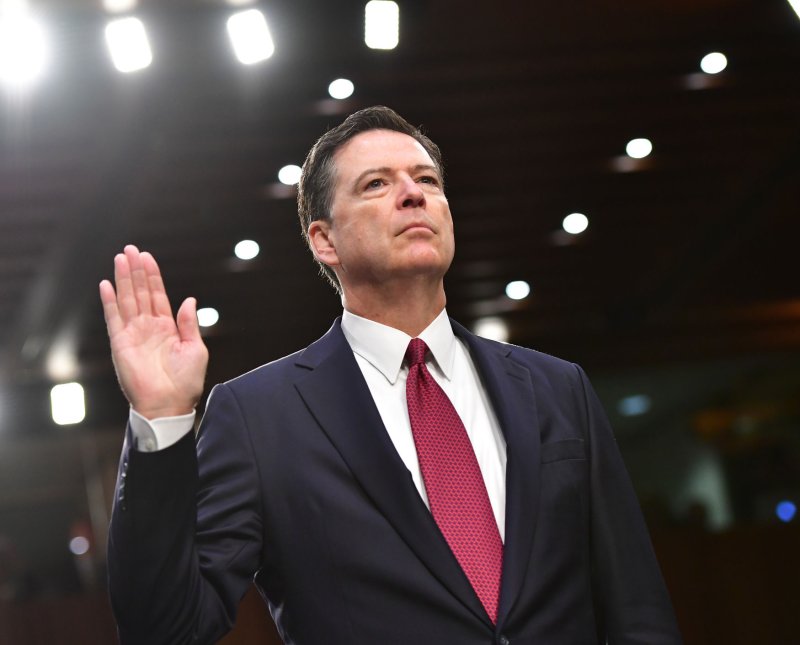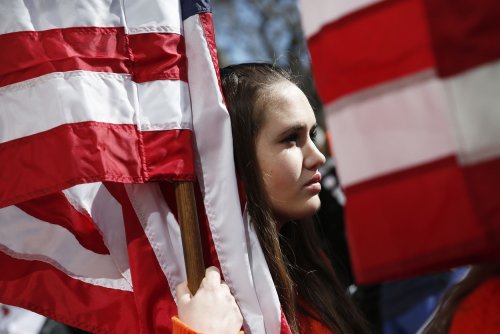1 of 2 | Justice Department Inspector General Michael Horowitz said his office is conducting an investigation into former FBI Director James Comey's memos during a hearing Monday regarding the FBI's handling of its investigation into former Secretary of State Hilary Clinton's emails. File Photo by Kevin Dietsch/UPI |
License Photo
June 18 (UPI) -- Justice Department Inspector General Michael Horowitz said Monday his office is conducting an investigation into former FBI Director James Comey's private memos.
Horowitz made the comment as he -- along with FBI Director Christopher Wray -- testified before the Senate judiciary committee about a 500-page report released Thursday assessing the FBI's handling of an investigation into former Secretary of State Hillary Clinton's emails.
During the hearing Horowitz said his office was conducting a probe into Comey's private memos, which detailed what the former FBI director described as troubling encounters with President Donald Trump. The inspector general also sought to determine whether any classified information in the memos was handled improperly.
"We received a referral on that from the FBI, we are handling that referral and we will issue a report when the matter is complete," he told the Senate panel.
Wray promised to bring about reforms to prevent similar mistakes, adding he had already ordered an assessment of how the FBI handles sensitive investigations and ordered in-depth training for senior managers and created a unit tasked specifically with investigating leaks.
"I see the FBI up close, every day," Wray said. "The conduct, the character the principle that I see in those people every day is extraordinary and would be an inspiration to the members of the committee."
Horowitz also addressed text messages between two FBI officials who would go on to work on special counsel Robert Mueller's investigation into alleged Russian meddling in the 2016 elections.
In the messages, exchanged prior to the formation of Mueller's team and the election, FBI lawyer Lisa Page asked investigator Peter Strzok if Trump would ever be president.
"No. No he won't. We'll stop it," Strzok replied
Horowitz said the "inappropriate political messages cast a cloud" over the email probe and may have affected an FBI agent's decision to prioritize the Russia investigation
"We found the implication that senior FBI employees would be willing to take official action to impact a presidential candidate's electoral prospects to be deeply troubling and antithetical to the core values of the FBI and the Justice Department," he said.
He added there was no evidence of political bias or improper considerations in closing the Clinton probe without seeking prosecution.
Horowitz dismissed claims by Trump that the report exonerated him of possible collusion with Russia, stating the department "did not look into collusion questions."
Wray added he didn't agree with Trump's assertions that the Russia investigation has been a "witch hunt" and that the FBI would continue its investigation despite criticism.
"There's a reason I always say that we are going to do our work independently and objectively, no matter who likes it," he said.
During the hearing Horowitz also reasserted statements made in the report that Comey "clearly departed from FBI and Department norms" in his handling of the email investigation.
"His decisions negatively impacted the perception of the FBI and the Department as fair administrators of justice," Horowitz said.
He added Comey's announcement that the FBI wouldn't seek charges against Clinton in July 2016 "included inappropriate commentary about uncharged conduct, announced his views on what a 'reasonable prosecutor' would do, and served to confuse rather than clarify public understanding of his recommendation."















